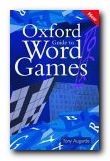puzzles, puns, acrostics, charades, and palindromes
If you like words, wordplay, and peculiarities of the English Language, you’ll love The Oxford Guide to Word Games. What is the difference between elephants and fleas? Answer: an elephant can have fleas, but fleas cannot have elephants. Each chapter deals with a different play on words – ranging from the lowly pun to extremely sophisticated word squares. And there are plenty of surprises along the way. I didn’t realise that charades started out in written, not acted form.
 There are also lots of unusual cases along the way, such as words which can be split into three and even four separate words – as when sometime becomes So-Met-I-Me. An acrostic is formed from the first letter of each line, but it can also be the last, and in more complex examples, elsewhere in the line, including ‘double acrostics’ in which the first and last letter (reversed) of each line are related to each other. The example given is attributed to Queen Victoria.
There are also lots of unusual cases along the way, such as words which can be split into three and even four separate words – as when sometime becomes So-Met-I-Me. An acrostic is formed from the first letter of each line, but it can also be the last, and in more complex examples, elsewhere in the line, including ‘double acrostics’ in which the first and last letter (reversed) of each line are related to each other. The example given is attributed to Queen Victoria.
This leads into the immensely complicated world of word squares, which were the origin of the surprisingly recent (1913) crossword puzzle – now the most world-popular word game. This section actually teaches you how to solve common types of crossword clues.
There’s also a brief history of Scrabble – one of the most commercially successful word games. Here you get tips on how to increase your score, plus a consideration of rare and exotic words – zoae and qibla and more interestingly of the dictionaries that contain them.
The rebus seems to anticipate the text message by five thousand years or so, using a printed symbol to represent a phrase, as in If the gr8 B mt, put : – in other words, ‘If the grate be empty, put coal on’.
Palindromes can be single words (Eve) or sentences – as in the famous Madam, I’m Adam. The general quest seems to be for the longest palindromic utterance, but interestingly, sense recedes as the sentences lengthen, as this example begins to show – Marge lets Norah see Sharon’s telegram.
All sorts of word games are illustrated – pangrams, lipograms, and chronograms – many of which are no longer fashionable, but which retain a period charm. There’s also plenty on tongue-twisters, Spoonerisms, alphabet games, and malapropisms.
Prostitutes appeal to Pope
Doctor Fuchs off to South Pole
March planned for April
This is a witty and entertaining book which manages to include etymological scholarship alongside how to play lexical ping-pong or how to crack a rebus such as EGNC for Aegean Sea. It’s great fun for anyone interested in word play, etymology, and a fun and games approach to language.
© Roy Johnson 2003
Tony Augarde, The Oxford Guide to Word Games, Oxford: Oxford University Press, 2003, pp.304, ISBN: 0198662645
More on dictionaries
More on language
More on literary studies
More on grammar